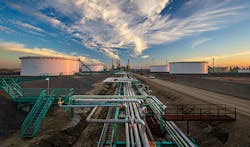Federated Co-operatives adding renewable fuels plant at Saskatchewan refinery
Federated Co-operatives Ltd. (FCL) has let a contract to Topsøe AS to deliver process technology for a grassroots plant designed to produce low-carbon renewable diesel at its 130,000-b/d Co-op Refinery Complex (CRC) in Regina, Sask., Canada.
As part of the Oct. 26 contract, Topsøe will license its proprietary HydroFlex process technology to enable the proposed plant’s processing of canola oil into 15,000 b/d of renewable diesel, the service provider said.
To be part of the larger integrated agriculture complex (IAC) planned by FCL’s joint venture with AGT Food and Ingredients Inc. (AGT Foods)—which will include a canola-crushing plant—the renewable diesel plant supports FCL’s broader transition to a future low-carbon economy, said Gil Le Dressay, FCL’s vice-president of manufacturing.
If approved, the new renewable diesel plant is scheduled to enter production in 2027, according to Topsøe.
A value of the technology licensing contract was not revealed.
Energy transition plans
The contract follows FCL’s November 2021 notice to members that it secured a $5.48-million (Can.) land option from Regina’s city council to purchase property north of the CRC specifically for construction of the renewable diesel plant.
Securing of the land option was to enable FCL to begin formally assessing the project from a feasibility, engineering, and regulatory standpoint ahead of reaching final investment decision (FID) on the project, the operator said.
Formation of the partnership with AGT Foods followed in early 2022 with the companies’ entrance into a memorandum of understanding (MOU) under which FCL (51%) and AGT Foods (49%) plan to build the IAC as part of the operators’ shared goals of decarbonizing the Western Canadian economy while supporting regional crop production, FCL said in a Jan. 17 release.
As part of the MOU, the IAC’s $360-million canola crushing plant will supply about 50% of required feedstock for the proposed renewable diesel complex, which will source its remaining plant-based feedstock requirements from other regional canola crushing plants.
Alongside its $2-billion investment in construction of the IAC, FCL also signed an MOU with Whitecap Resources Inc. under which FCL plans to fund, build, and operate plants at the CRC and Co-op Ethanol Complex near Belle Plaine, Sask., to capture nearly 500,000 tonnes/year (tpy) of CO2 emissions for transport, storage, and use at the nearby Whitecap-operated Weyburn unit, which is currently the world’s largest carbon capture, utilization, and storage (CCUS) project, according to a late-October 2022 release from the companies.
In its latest annual report to members, FCL said it expects carbon capture at CEC to begin in 2024, with startup of carbon capture at CRC to follow in 2026.
FCL said the renewable diesel plant and CO2-capturing projects are steps in its goal to achieve a 40% reduction its greenhouse gas (GHG) emissions from 2015 levels by 2030 and attain net zero emissions from all operations by 2050.
About the Author
Robert Brelsford
Downstream Editor
Robert Brelsford joined Oil & Gas Journal in October 2013 as downstream technology editor after 8 years as a crude oil price and news reporter on spot crude transactions at the US Gulf Coast, West Coast, Canadian, and Latin American markets. He holds a BA (2000) in English from Rice University and an MS (2003) in education and social policy from Northwestern University.

